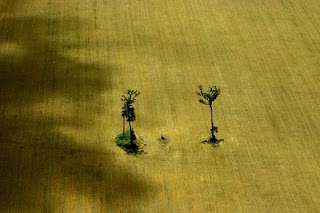-
Amazon Fund to Target Sustainable Development; Strong First Step, Say Experts
August 30, 2008 By Wilson Center Staff Last month, in an effort to prevent further deforestation of the Amazon, Brazil announced the creation of the Amazon Fund, which aims to make preserving the world’s largest tropical rain forest more lucrative than destroying it. Norway was the first country to contribute to the initiative, offering a pledge of $100 million. Officials project that the fund may receive up to $1 billion in its first year and may accrue as much as $21 billion by 2121.
Last month, in an effort to prevent further deforestation of the Amazon, Brazil announced the creation of the Amazon Fund, which aims to make preserving the world’s largest tropical rain forest more lucrative than destroying it. Norway was the first country to contribute to the initiative, offering a pledge of $100 million. Officials project that the fund may receive up to $1 billion in its first year and may accrue as much as $21 billion by 2121.
By creating an endowment open to international investors, Brazil appears to have shed some of its usual suspicions of foreign encroachment on the Amazon and acknowledged that conservation efforts will only be sustainable with considerable outside support. Yet the funds will still be controlled by Brazil’s National Development Bank (BNDES)—which, according to BNDES environment director Eduardo de Mello, means “donors will have no say over the use of [the Amazon Fund’s] resources.” Within BNDES, a steering committee made up of federal and state officials will be in control of the funds. According to the proposal listed online by BNDES, the Amazon Fund will target the following areas: Brazilian sovereignty; infrastructure development; combating deforestation; indigenous rights; sustainable development; and government, business, and civil cooperation.
The Amazon Fund is guided by the Brazilian government’s Plano Amazônia Sustentável (PAS), or Sustainable Amazon Plan, which was issued in May 2008. Carlos Nobre, a senior climate scientist at Brazil’s National Institute for Space Research, was one of the principal architects of this plan, and presented it to an American audience at a January 16, 2008, conference at the Woodrow Wilson Center. PAS offers a holistic vision for protecting the Amazon that goes beyond conservation efforts, calling for the creation of a new economic paradigm centered on sustainably “globalizing the development capacity of the Amazon and producing value-added goods and services.” Nobre told Reuters that while the Amazon Fund is a positive initial step, it nevertheless “just postpones deforestation…the final fix is to create a new economy that can give jobs to several million people.” This “paradigm shift,” he explained, requires the entrepreneurial capacity to “translate biodiversity wealth into economic wealth.”
Response to the Amazon Fund has been generally positive, albeit guarded. According to Paulo Gustavo Prado, environmental policy director of Conservation International’s (CI) Brazil program, the Fund is a helpful move in the fight to combat deforestation in the Amazon, but is still a work “under construction” (e-mail exchange with Alan Wright). For instance, it is possible that the resources will be used to fill “gaps in governance”—in other words, to fund additional enforcement actions against illegal logging in the Amazon—and therefore have little direct impact on Amazonian society as whole. He observed that the prospect for private-sector involvement seems limited by the fact that funders will have no influence over the use of funds, so the initiative is unlikely to draw money for carbon-offset projects. Prado remarked that by reducing the cost of conservation-related activities, it appears that the Amazon Fund will encourage the work of organizations such as CI. He also stressed CI’s commitment to see that the Fund will be made available to researchers and scientists, and that indigenous and local communities and state and municipal governments will be involved in the decision-making process.
It remains to be seen how other issues—such as the ambitious Initiative for the Integration of the Regional Infrastructure of South America (IIRSA), lingering land rights issues, and Brazil’s commodity export boom—will affect the Amazon Fund’s overall efficacy.
By Brazil Institute Program Assistant Alan Wright and Brazil Institute Intern Matthew Layton.Photo: Area deforested for agricultural use in the state of Mato Grosso, Brazil. Courtesy of flickr user leoffreitas.
 A Publication of the Stimson Center.
A Publication of the Stimson Center.

 Last month, in an effort to prevent further deforestation of the Amazon, Brazil announced the creation of the
Last month, in an effort to prevent further deforestation of the Amazon, Brazil announced the creation of the 

